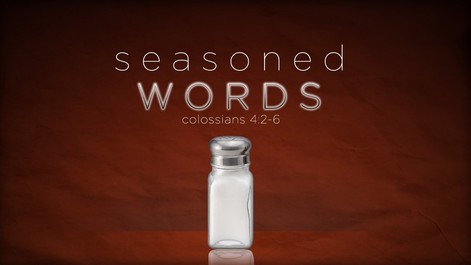THE WISDOM OF ABIGAIL: A MODEL FOR GOOD PEOPLE SKILLS PEOPLE SKILL #4: SEASONING YOUR WORD4/17/2017
 Great communicators don’t accuse and condemn. There will always be misunderstandings, offenses, and difficult confrontations that we must navigate in life. People who can do so in a way that restores relationships rather than driving people away will always excel. It’s important to be right, but it’s better to be right without offending the people around you and isolating yourself. Colossians 4:6 says, “Let your speech always be with grace, seasoned with salt, that you may know how you ought to answer each one.” When you perceive that a person is in the wrong, the best way to approach it is not with a condemnation. Instead, remember that you may have misunderstood the person or misinterpreted their position. Therefore, approach the conversation with a humble and meek spirit. Say to them, “Help me understand something,” or, “There’s something I’m not clear about.” And then go on to state what you perceive as the person’s position. In situations where you’re confronting behavior that you know the person is guilty of, rather than accusing them of trying to hurt you or be negligent, use the approach: “When you do that, it makes me feel like you…,” or “Whenever you say that, I have the perception that you…,” and then state how you feel. Remember that whenever you accuse or condemn someone, they will always go on the defensive. This escalates the exchange and causes friction to turn into firestorms. People who can deescalate and speak calmly and with control are perceived as calm and controlled people who seek excellence and professionalism. Be that kind of a person and you’ll go to the next level. For more information on great people skills, check out my latest book, UPWARD: Taking Your Life to the Next Level now available on Amazon. Comments are closed.
|
Archives
February 2023
Categories
All
It was concerning King Saul that David said, “How the mighty have fallen, and the weapons of war perished.” His was a life that began with great promise and celebration, but ended in miserable failure and humiliation. His life is an example of how the mightiest of leaders fail.
Why do great men and women fall? How do leaders, quick to ascend with such promise of unparalleled success, find themselves awash in disastrous failure and disgrace? More importantly, can the path toward one’s downfall be discerned before it’s too late and be avoided? It is the premise of my newest book, How The Mighty Have Fallen that such a decline can be detected and reversed. The life and leadership career of King Saul, Israel's first king, provides us with a treasury of examples of "what not to do." The below blog post is the first in series of excerpts from the book to examine and avoid Saul's mistakes and find a successful path through leadership. READ AN EXCERPT |
all content on this website is ©GreggTJohnson

 RSS Feed
RSS Feed